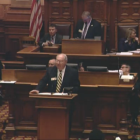
Across the Nation, State Legislatures Focused on Children in 2012
|
State legislatures across the United States have been busy this year with youth and juvenile justice-related legislation. While there have been some failures, such as the last-minute death in the Georgia General Assembly of a comprehensive juvenile code rewrite — a bill that many feared county governments couldn’t afford — other states are working on or have managed to pass significant measures. A few of them are noted below. Perhaps one of the biggest efforts is in California where Gov. Jerry Brown has announced plans to close all of his state’s remaining juvenile detention centers, transferring responsibility for the youth detained there to county parole departments and effectively eliminating the state’s Department of Juvenile Justice (DJJ). Consequently, most juveniles in the system would be referred to rehabilitation programs in their home communities.

